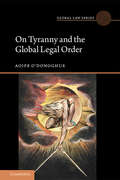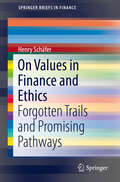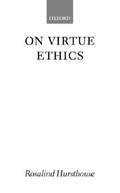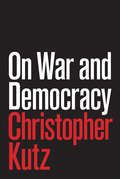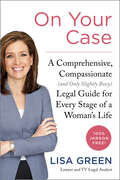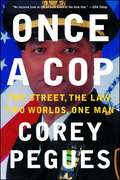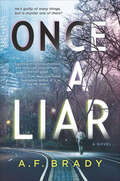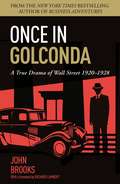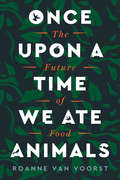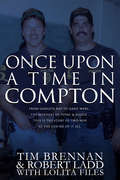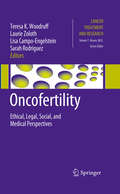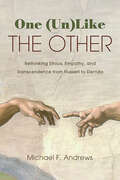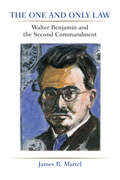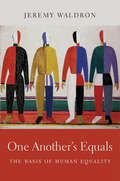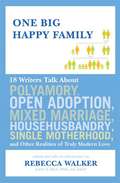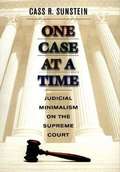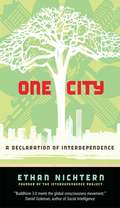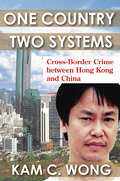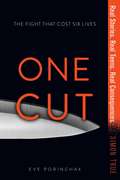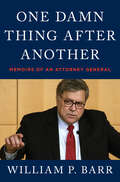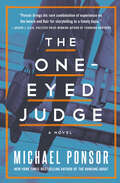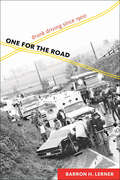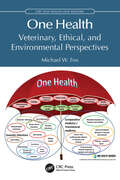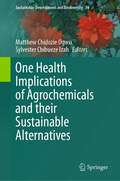- Table View
- List View
On Tyranny and the Global Legal Order (Global Law Series)
by Aoife O'DonoghueSince classical antiquity debates about tyranny, tyrannicide and preventing tyranny's re-emergence have permeated governance discourse. Yet within the literature on the global legal order, tyranny is missing. This book creates a taxonomy of tyranny and poses the question: could the global legal order be tyrannical? This taxonomy examines the benefits attached to tyrannical governance for the tyrant, considers how illegitimacy and fear establish tyranny, asks how rule by law, silence and beneficence aid in governing a tyranny. It outlines the modalities of tyranny: scale, imperialism, gender, and bureaucracy. Where it is determined that a tyranny exists, the book examines the extent of the right and duty to effect tyrannicide. As the global legal order gathers ever more power to itself, it becomes imperative to ask whether tyranny lurks at the global scale.
On Values in Finance and Ethics: Forgotten Trails and Promising Pathways (SpringerBriefs in Finance)
by Henry SchäferThis book uses the building blocks of modern capital market theory, including behavioural finance, as the point of departure for an analysis of hidden ethical content in the contemporary research into capital markets. It illustrates the significant degree of alienation between the financial and the real side of economies, stemming from the long-standing struggle between ethics and economics. Furthermore, it provides a roadmap of modern value thinking, highlighting the crucial role of stakeholders and non-governmental organizations.
On Virtue Ethics
by Rosalind HursthouseRosalind Hursthouse, who has done much to restore the virtues to prominence in contemporary moral philosophy, now presents a full exposition and defence of her own version of virtue ethics. She discusses a wide range of philosophical topics, including action, duty, dilemmas, moral absolutism, and the moral significance of the emotions. Her clear, engaging style will make On Virtue Ethics attractive to readers at all levels.
On War and Democracy
by Christopher KutzOn War and Democracy provides a richly nuanced examination of the moral justifications democracies often invoke to wage war. In this compelling and provocative book, Christopher Kutz argues that democratic principles can be both fertile and toxic ground for the project of limiting war's violence. Only by learning to view war as limited by our democratic values--rather than as a tool for promoting them--can we hope to arrest the slide toward the borderless, seemingly endless democratic "holy wars" and campaigns of remote killings we are witnessing today, and to stop permanently the use of torture and secret law.Kutz shows how our democratic values, understood incautiously and incorrectly, can actually undermine the goal of limiting war. He helps us better understand why we are tempted to believe that collective violence in the name of politics can be legitimate when individual violence is not. In doing so, he offers a bold new account of democratic agency that acknowledges the need for national defense and the promotion of liberty abroad while limiting the temptations of military intervention. Kutz demonstrates why we must address concerns about the means of waging war--including remote war and surveillance--and why we must create institutions to safeguard some nondemocratic values, such as dignity and martial honor, from the threat of democratic politics.On War and Democracy reveals why understanding democracy in terms of political agency, not institutional process, is crucial to limiting when and how democracies use violence.
On Your Case: A Comprehensive, Compassionate (and Only Slightly Bossy) Legal Guide for Every Stage of a Woman's Life
by Lisa GreenTelevision legal analyst and attorney Lisa Green offers something new: a witty, direct and empowering legal guide for women, filled with accessible information they can employ to understand and respond to common legal issues throughout their lives, from dating, marriage, and kids to jobs, retirement, aging parents, and wills.Lisa Green has an urgent message for women of all ages, especially those who consider themselves fully briefed on nutrition, personal finance, good schools, and great bargains:What about the law?Whether or not you invite it into your life, the law will find you. When it does, will you be ready to respond?In On Your Case, Lisa fills a long-standing gap in women's bookshelves with a thorough, compelling and occasionally hilarious guide to the range of legal issues women can expect to confront throughout their busy lives. Leveraging her professional training as a lawyer and her personal experience as a wife, ex-wife, mother, and daughter, Lisa explains common, even complicated, legal issues in practical, easy to understand terms. Sharing true stories, from jaw-dropping court cases to her own personal challenges, Lisa explains how readers can make the best possible decisions when problems arise. And legal problems will arise, Lisa counsels, so women need to get smart, and get ready.In her warm, yet firm, voice, Lisa guides readers through the potential legal issues around: Relationships: Online dating, pre and postnuptial agreements, engagement and marriage Separation and Divorce: Splitting without anxiety, child custody and support, pet custody disputes Babies, Children and Teens: Pregnancy and adoption, advocating for a special needs child, misbehaving teens Work: Employment and household help Domestic violence Social media Midlife and elder care: Wills, medical decisions and power of attorney Legal Help: Hiring a lawyer, DIYAs Suze Orman demystified personal finance and put women in the driver's seat of their own financial future, Lisa Green now does for the law. With On Your Case, Lisa empowers you by equipping you with the tools you need to take care of yourself, your assets, your family, and your career.
Once a Cop: The Street, the Law, Two Worlds, One Man
by Corey PeguesNew York City Book Awards Hornblower Award Winner African American Literary Award Winner for Best Biography/Memoir As a youth, Corey Pegues was a criminal. As an adult, he became a high-ranking police officer.In this fascinating look at life on both sides of the law, Corey Pegues opens up about why he joined the New York Police Department after years as a drug dealer. Pegues speaks honestly about the poor choices he made while coming of age in New York City during the height of the crack epidemic. He&’s equally candid about why he turned his life around, and takes you inside the NYPD, where he becomes a decorated officer despite bureaucratic pitfalls and discriminatory practices. Written with the voice and panache of someone who knows the streets, Once a Cop is a credible and informative look at the forces that lead some into a life of crime and what it means to make good on a second chance.
Once a Liar: A Novel
by A. F. BradyIn this electrifying psychological thriller, a high-powered sociopath meets his reckoning when he’s accused of the brutal murder of his mistress.Did he kill Charlie Doyle? And if he didn’t…who did?Peter Caine, a cutthroat Manhattan defense attorney, worked ruthlessly to become the best at his job. On the surface, he is charming and handsome, but inside he is cold and heartless. He fights without remorse to acquit murderers, pedophiles and rapists.When Charlie Doyle, the daughter of the Manhattan DA—and Peter’s former lover—is murdered, Peter’s world is quickly sent into a tailspin. He becomes the prime suspect as the DA, a professional enemy of Peter’s, embarks on a witch hunt to avenge his daughter’s death, stopping at nothing to ensure Peter is found guilty of the murder.In the challenge of his career and his life, Peter races against the clock to prove his innocence. As the evidence mounts against him, he’s forced to begin unraveling his own dark web of lies and confront the sins of his past. But the truth of who killed Charlie Doyle is more twisted and sinister than anyone could have imagined…
Once in Golconda: A True Drama of Wall Street 1920-1928
by John BrooksAt noon, on September 16, 1920, a horrendous explosion rocked Wall Street, instantly claiming the lives of thirty pedestrians and seriously injuring hundreds more. Yet, for all of its awesome force, that bomb was a firecracker compared to another, much more spectacular one, several years later - the great stock market crash of 1929.Once in Golconda is a dramatic chronicle of the breath-taking rise, devastating fall, and painstaking rebirth of Wall Street in the years between the wars. Focusing on the lives and fortunes of some of the era's most memorable traders, bankers, boosters, and frauds, John Brooks brings to vivid life all the ruthlessness, greed, and reckless euphoria of the '20s bull market, the desperation of the days leading up to the crash of '29, and the bitterness of the years that followed. Writing with authority, verve, and considerable humour, Brooks introduces us to a bygone world in which the likes of Junius Morgan and fellow members of the Yankee "aristocracy" jealously controlled Wall Street as if it were their private hunting preserve. At the centre of this colourful whirlwind of a tale is the magnificently hubristic Richard Whitney. The story of his rise to the presidency of the New York Stock Exchange and his eventual downfall and imprisonment for stock fraud and embezzlement characterizes the play of monumental forces that transformed Wall Street from WASP Camelot to public institution. Though it was first published in 1969, this riveting tale explores timeless themes of profound significance for today's investors - from the corruption that led to the creation of today's securities laws to the folly of investor hubris in a bull market.'A fast-moving, sophisticated account . . . embracing the stock-market boom of the twenties, the crash of 1929, the Depression, and the coming of the New Deal. Its leitmotif is the truly tragic personal history of Richard Whitney, the aristocrat Morgan broker and head of the Stock Exchange, who ended up in Sing Sing.' Edmund Wilson, writing in the New Yorker
Once Upon a Time We Ate Animals: The Future of Food
by Roanne van VoorstCombining the ethical clarity of Jonathan Safran Foer’s Eating Animals with the disquieting vision of Alan Weissman’s bestseller The World Without Us, a thought-provoking, entertaining exploration of a future where animal consumption is a thing of the past.Though increasing numbers of people know that eating meat is detrimental to our planet’s health, many still can’t be convinced to give up eating meat. But how can we change behavior when common arguments and information aren’t working? Acclaimed anthropologist Roanne Van Voorst changes the dialogue. In Once Upon a Time We Ate Animals, she shifts the focus from the present looking forward to the future looking back—imagining a world in which most no longer use animals for food, clothing, or other items. By shifting the viewpoint, she offers a clear and compelling vision of what it means to live in a world without meat.A massive shift is already taking place—everything van Voorst covers in this book has already been invented and is being used today by individuals and small organizations worldwide. Hopeful and persuasive, Once Upon a Time We Ate Animals offers a tantalizing vision of what is not only possible but perhaps inevitable.
Once Upon A Time in Compton: From Gangsta Rap To Gang Wars... The Murders Of Tupac And Biggie... . This Is The Story Of Two Men At The Center Of It All
by Lolita Files Robert Ladd Tim BrennanFrom Gangsta rap to gang wars and everything in between…. Former Compton police officers Tim Brennan and Robert Ladd have seen it all….. And now, they’re telling all….. For twenty years, gang unit detectives Tim Brennan and Robert Ladd patrolled the streets of Compton. They witnessed the birth and rise of gangsta rap with acts they knew personally, such as N.W.A and D.J. Quik; dealt firsthand with the chaos of the L.A. riots, its aftermath, and the gang truce that followed; were involved in the investigations of the murders of hip-hop stars Tupac Shakur and The Notorious B.I.G., and were major players in an all-out tug-of-war with City Hall that ultimately resulted in the permanent shut-down of the Compton Police Department. Through it all, they developed an intricate knowledge of gangs and the streets and a methodology that has been implemented by local law enforcement agencies across the country. Their compassionate and fair approach to community policing earned them the respect of citizens and gangbangers alike. This story - told with bestselling author Lolita Files, whose research with Brennan and Ladd has spanned over four years - is a firsthand glimpse into a world during an era many have heard about in song and legend, but have rarely had the opportunity to witness at ground level, from the inside out, through the eyes of two men who witnessed and experienced it all.
Oncofertility
by Lisa Campo-Engelstein Sarah Rodriguez Laurie Zoloth Teresa K. WoodruffOncofertility has emerged as a way to address potential lost or impaired fertility in cancer patients and survivors, with active biomedical research that is developing new ways to help these individuals preserve their ability to have biological children. In order to move beyond oncofertility as a science and medical technology and begin to address the ethical, legal, and social ramifications of this emerging field, we must give voice to scholars from the humanities and social sciences to engage in a multidisciplinary discussion. This book brings together a pool of experts from a variety of fields, including communication, economics, ethics, history, law, religion, and sociology, to examine the complex issues raised by recent developments in oncofertility and to offer advice from national and international perspectives as we create new technology. Given the inherent interdisciplinary nature of oncofertility, this book is not only valuable, but also necessary to cultivate a deep understanding of new issues with the eventual aim of offering proposals for addressing them. Indeed, this book will be useful for people not only within the humanities and social sciences disciplines but also for those who are confronted with cancer and the possibility of impaired fertility and the medical practitioners within oncology and reproductive medicine who are at the front lines of this emerging field.
One: Rethinking Ethics, Empathy, and Transcendence from Husserl to Derrida (SUNY series in Theology and Continental Thought)
by Michael F. AndrewsOne (Un)Like the Other responds to the question, "What are the conditions of possibility that make genuine knowledge of other persons—and, therefore, love—possible?" By providing an original interpretive framework for exploring ethics in relation to empathy and transcendence from multiple perspectives in continental philosophy, empathy is described as a trace of what remains essentially and irreducibly "other" in every act of givenness. The use of the phenomenological method places "Einfühlung theory" in its rich historical context, beginning with Husserl and the early phenomenologists and extending to contemporary issues that explore "otherness" in light of consciousness, gender, embodiment, community, intentionality, emotions, intersubjectivity, values, language, and apophatic discourse. The implications of recasting "empathy" in an interpretive and dialogical model of reciprocity envision new paradigms of understanding ethics as an infinite playing field. No longer subservient to metaphysics and ontology, empathy is described as an act of infinite concern, a "hermeneutics of suspicion" that transcends epistemological theory and ethical command. Drawing on Husserl, Scheler, Stein, Heidegger, Levinas, Derrida, and others, this study presents an examination and expansion of empathy as an encounter with otherness in its most radical and transcendent forms.
One And Only Law: Walter Benjamin And The Second Commandment
by James MartelWalter Benjamin's "Critique of Violence," widely considered his final word on law, proposes that all manifestations of law are false stand-ins for divine principles of truth and justice that are no longer available to human beings. However, he also suggests that we must have law--we are held under a divine sanction that does not allow us to escape our responsibilities. James R. Martel argues that this paradox is resolved by considering that, for Benjamin, there is only one law that we must obey absolutely--the Second Commandment against idolatry. What remains of law when its false bases of authority are undermined would be a form of legal and political anarchism, quite unlike the current system of law based on consistency and precedent. Martel engages with the ideas of key authors including Alain Badiou, Immanuel Kant, and H. L. A. Hart in order to revisit common contemporary assumptions about law. He reveals how, when treated in constellation with these authors, Benjamin offers a way for human beings to become responsible for their own law, thereby avoiding the false appearance of a secular legal practice that remains bound by occult theologies and fetishisms.
One Another’s Equals: The Basis of Human Equality
by Jeremy WaldronAn enduring theme of Western philosophy is that we are all one another’s equals. Yet the principle of basic equality is woefully under-explored in modern moral and political philosophy. What does it mean to say we are all one another’s equals? Jeremy Waldron confronts this question fully and unflinchingly in a major new multifaceted account.
One big happy family: 18 Writers Talk About Polyamory, Open Adoption, Mixed Marriage, Househusbandry, Single Motherhood, and Other Realities of Truly Modern Love
by Rebecca WalkerEdited by bestselling author Rebecca Walker, this anthology invites us to step into the center of a range of different domestic arrangements and take a good look around. From gay adoption to absentee fathers, from open marriages to green-card marriages, the reality of the American household has altered dramatically over the last three decades. With changing values and expectations, fluid gender roles, and a shifting economy, along with increase in infertility, adoption, and the incidence of mixed-race couples, people across the country are redefining the standard arrangement of family life. In a collection of eighteen honest, personal, and deeply affecting essays from an array of writers, One Big Happy Familyoffers a fresh look at how contemporary families are adapting to this altering reality. Each writing from the perspective of his or her own unique domestic arrangements and priorities, the authors of these essays explore topics like transracial adoption, bicultural marriage and children, cohousing, equal parenting, and the creation of virtual families. Dan Savage writes about the unexpected responsibilities of open adoption. Jenny Block tells of the pros and cons of her own open marriage. ZZ Packer explores the ramifications of, and her own self-consciousness about, having a mixed-race child. asha bandele writes of her decision to have a child with a man in prison for life. And Min Jin Lee points to the intimacy shared by a mother and her child's hired caregiver. All of these pieces smartly discuss the various cultural pressures, issues, and realities for families today, in a manner that is inviting and accessible. Sometimes humorous, sometimes moving, sometimes shocking, but always fascinating.
One Case at a Time: Judicial Minimalism on the Supreme Court
by Cass R. SunsteinExplains and documents legal minimalism
One City
by Ethan NichternWhat you wear. What you say. What you think/ignore/buy/don't buy... Welcome to One City-Population: Everyone-where EVERYTHING you do matters. You've lived here your whole life, whether you know it or not. Ethan Nichtern, the charismatic and creative force behind New York's upstart Interdependence Project is your guide to the beauty that is everywhere in the urban jungle-in the rattling of subway trains, the screechings of traffic, the hum and drone of millions scurrying for work, food, sustenance, art, culture, and meaning. There may be no greater setting for exploring the great truth that Dr. Martin Luther King Jr. expounded: "Whatever effects one directly, effects all indirectly." One City melds Dr. King's message with modern Buddhist wisdom to offer a new way of understanding what binds us all together-no matter where we are, no matter who. With its pop-culture savvy, humor, and literary liveliness, One City will speak to--and even, it's fair to say, help define--the spiritually-inclined, conscious Next Generation.
One Country, Two Systems: Cross-Border Crime Between Hong Kong and China
by Kam C. WongThe legal issues evoked by cross-border crime in Hong Kong and China are sparse and what does exist is mostly in Chinese. This book provides the first systematic, comprehensive, and in-depth analysis of how Chinese, British, Hong Kong, and international law were applied in the Big Spender case. Kam C. Wong outlines the respective positions of various parties to the dispute. Part of the case's fascination involves competing interests, and that political clout counted for more than legal theory.Big Spender may be little known outside Hong Kong and China, but he made history there. It was the first time a Hong Kong legal resident had been prosecuted, tried, and ultimately executed in China for acts largely perpetrated in Hong Kong. The case tested the limits of the one-country, two-systems approach under which Hong Kong and China coexist. It also forced politicians, government officials, and the public in both Hong Kong and China to come to terms with the legal and policy issues related to cross-border crime.Wong sees the Big Spender case as making clear the dire need for both sides to find workable solutions to concurrent jurisdiction, police cooperation, and judicial assistance. Until there is an acceptable arrangement governing the rendition of offenders between Hong Kong and mainland China, the one- country, two-systems formula cannot be stabilized. This is a case study in large-scale terms.
One Cut (Simon True)
by Eve PorinchakReal stories. Real teens. Real crimes. A backyard brawl turned media circus filled with gang accusations turns a small, quiet town upside down in this second book in the new Simon True series.On May 22, 1995 at 7 p.m. sixteen-year-old Jimmy Farris and seventeen-year-old Mike McLoren were working out outside Mike’s backyard fort. Four boys hopped the fence, and a fight broke out inside the dark fort made of two-by-four planks and tarps. Within minutes, both Mike and Jimmy had been stabbed. Jimmy died a short time later. While neighbors knew that the fort was a local hangout where drugs were available, the prosecution depicted the four defendants as gang members, and the crime as gang related. The accusations created a media circus, and added fuel to the growing belief that this affluent, safe, all-white neighborhood was in danger of a full-blown gang war. Four boys stood trial. All four boys faced life sentences. Why? Because of California’s Felony Murder Rule. The law states that “a death is considered first degree murder when it is commissioned during one of the following felonies: Arson, Rape, Carjacking, Robbery, Burglary, Mayhem, Kidnapping.” In other words, if you—or somebody you are with—intends to commit a felony, and somebody accidentally dies in the process, all parties can be tried and convicted of first degree murder and sentenced to life without parole, even if nobody had any intention of committing a murder. What really happened that day? Was it a case of robbery gone wrong? Gang activity? Or was it something else?
One Damn Thing After Another: Memoirs of an Attorney General
by William P. BarrThe former attorney general provides a candid account of his historic tenures serving two vastly different presidents, George H.W. Bush and Donald J. Trump. <p><p>William Barr’s first tenure as attorney general under President George H.W. Bush was largely the result of chance, while his second tenure under President Donald Trump a deliberate and difficult choice. In this candid memoir, Barr takes readers behind the scenes during seminal moments of the 1990s, from the LA riots to Pan Am 103 and Iran Contra. Thirty years later, Barr faced an unrelenting barrage of issues, such as Russiagate, the COVID outbreak, civil unrest, the impeachments, and the 2020 election fallout. One Damn Thing After Another is vivid, forthright, and essential not only to understanding the Bush and Trump legacies, but also how both men viewed power and justice at critical junctures of their presidencies. <p> <b>New York Times Bestseller</b>
The One-Eyed Judge: A Novel (The Judge Norcross Novels #2)
by Michael PonsorThe stunning new legal thriller from the New York Times–bestselling author of The Hanging Judge, &“a talent to watch&” (The Washington Post). When FBI agents barge into Sidney Cranmer&’s home accusing him of a heinous crime, the respected literature professor&’s life becomes a nightmare. Cranmer insists the illicit material found by the agents isn&’t his, but the charge against him appears airtight, and his academic specialty—the life and work of controversial author Lewis Carroll, creator of Alice&’s Adventures in Wonderland—convinces investigators he&’s lying. Presiding over the case against Professor Cranmer, U.S. District Judge David Norcross fears his daily confrontation with evil has made him too jaded to become a husband and father. His girlfriend, Claire Lindemann, teaches in the same department as the defendant and is convinced of his innocence. Soon, she will take matters into her own hands. Meanwhile—with his love life in turmoil and his plans for the future on hold—a personal tragedy leaves Norcross responsible for his two young nieces. Unbeknownst to him, a vengeful child predator hovers over his new family, preparing to strike. Michael Ponsor&’s debut novel, The Hanging Judge, was praised by retired Supreme Court justice John Paul Stevens for reminding readers &“that the judicial process is not infallible&” and by Pulitzer Prize–winning author Tracy Kidder for bearing &“the heft of authenticity.&” The One-Eyed Judge again draws on Ponsor&’s thirty years as a US district judge, offering readers an insider&’s view of one of the most harrowing kinds of cases faced by the courts. Fast-paced, thrilling, and thought-provoking, this is legal fiction at its most realistic and compelling. The One-Eyed Judge is the 2nd book in the Judge Norcross Novels, but you may enjoy reading the series in any order.
One for the Road: Drunk Driving since 1900
by Barron H. LernerDon’t drink and drive. It's a deceptively simple rule, but one that is all too often ignored. And while efforts to eliminate drunk driving have been around as long as automobiles, every movement to keep drunks from driving has hit some alarming bumps in the road. Barron H. Lerner narrates the two strong—and vocal—sides to this debate in the United States: those who argue vehemently against drunk driving, and those who believe the problem is exaggerated and overregulated. A public health professor and historian of medicine, Lerner asks why these opposing views exist, examining drunk driving in the context of American beliefs about alcoholism, driving, individualism, and civil liberties. Angry and bereaved activist leaders and advocacy groups like Mothers Against Drunk Driving campaign passionately for education and legislation, but even as people continue to be killed, many Americans remain unwilling to take stronger steps to address the problem. Lerner attributes this attitude to Americans’ love of drinking and love of driving, an inadequate public transportation system, the strength of the alcohol lobby, and the enduring backlash against Prohibition. The stories of people killed and maimed by drunk drivers are heartrending, and the country’s routine rejection of reasonable strategies for ending drunk driving is frustratingly inexplicable. This book is a fascinating study of the culture of drunk driving, grassroots and professional efforts to stop it, and a public that has consistently challenged and tested the limits of individual freedom. Why, despite decades and decades of warnings, do people still choose to drive while intoxicated? One for the Road provides crucial historical lessons for understanding the old epidemic of drunk driving and the new epidemic of distracted driving.
One Health: Veterinary, Ethical, and Environmental Perspectives (CRC One Health One Welfare)
by Michael W. FoxThis collection of reflective, critical, philosophical, and practical chapters represents the author’s 60 years as a veterinarian, ethologist, and bioethicist. The rising incidence of zoonotic diseases from farmed animals and wildlife in the expanding human population and so-called reverse zoonoses where humans are infecting other species are existential concerns. These concerns are linked with anthropogenic climate change and our impact on ecosystems which threaten biodiversity and the health and future of Homo sapiens and many other species.These interconnected issues are examined in this book, broadening the scope and agenda of what is currently more narrowly practiced as preventive medicine. The author calls for greater emphasis on holistic preventive health-care maintenance in response to the escalating costs of human and companion animal health problems, the welfare of factory farmed animals, and endangered status of many wild species.Our species now faces a complex existential crisis that must be addressed in an interdisciplinary way, because there are multiple contributing factors; factors that call for the insights of science and bioethics. Fearlessly tackling contentious issues and 'wicked problems,' Dr Michael W. Fox offers an integrated perspective of what One Health looks like on the ground.
One Health Implications of Agrochemicals and their Sustainable Alternatives (Sustainable Development and Biodiversity #34)
by Matthew Chidozie Ogwu Sylvester Chibueze IzahThis book focuses on the United Nations SDG 3, SDG 12, and SDG 15. The book covers the full range of issues associated with agrochemical use from a One Health standpoint to promote a cleaner and safer alternative that leaves little to no negative legacy on Earth’s natural, social, and economic systems. The main focus of the book is to address the biodiversity and human health, food security, and socio-environmental implications of agrochemical use in food production. It deals with the need to move away from the use of harmful chemicals in agriculture. The threat to key aspects of One Health will be used as evidence in support of the need to transition to safer and cleaner food production systems as well as the social, economic, health, and environmental viability of sustainable alternatives. One Health is the innovative convergence approach that encourages collaborative, cross-sectoral, and transdisciplinary methods to monitor, assess, report, and implement shared human health, biodiversity, and environmental challenges and goals such as agrochemical use. Conventional agrochemicals are chemicals used to protect plants, improve crop yield and manage agricultural fields but also have a negative legacy on Earth’s systems. This book is of interest and useful to agricultural trainees and trainers, soil, food and agricultural institutes, food and soil systems specialists, biodiversity and environmental managers, activists, practitioners, and students. It is also a useful read for conservationists and industries interested in promoting organic agriculture for a sustainable community, regional and global development.
One Hundred Million Acres
by Kirke Kickingbird Karen DucheneauxIndians from Alaska to Texas, from New York to California, are now claiming lands that are rightfully and legally theirs. Denying its own legal system, the federal government disputes Indian ownership of approximately one hundred million acres, which include presently held tribal lands and individually owned Indian lands; the Alaskan Settlement; administrative, submarginal, restoration, and surplus federal lands; and those lands belonging to terminated and nonfederal tribes.
